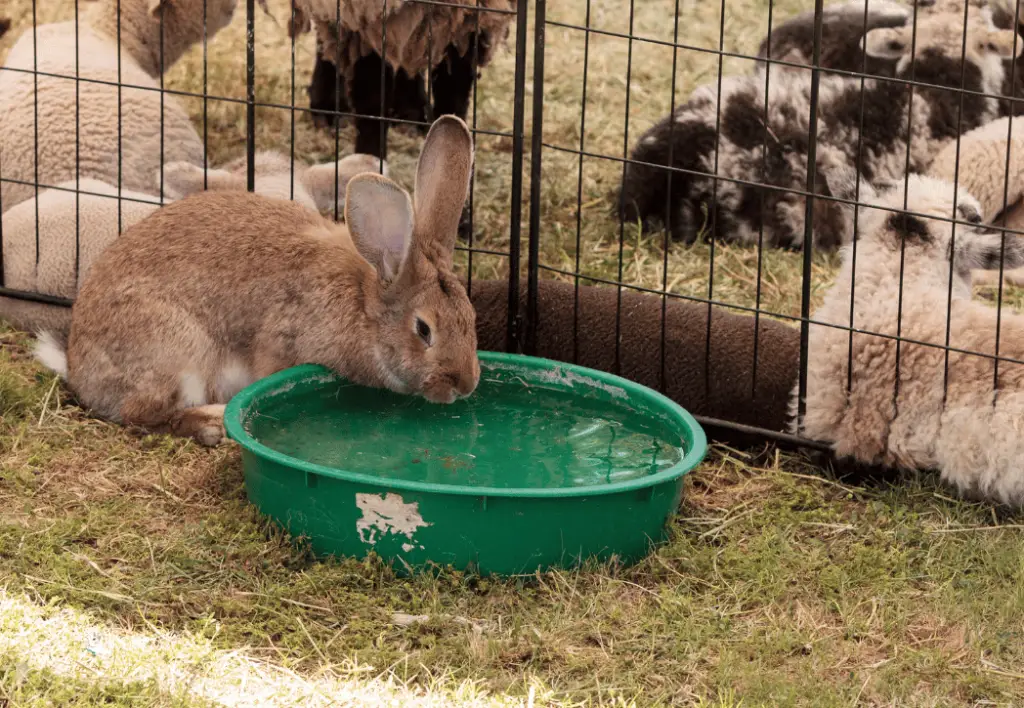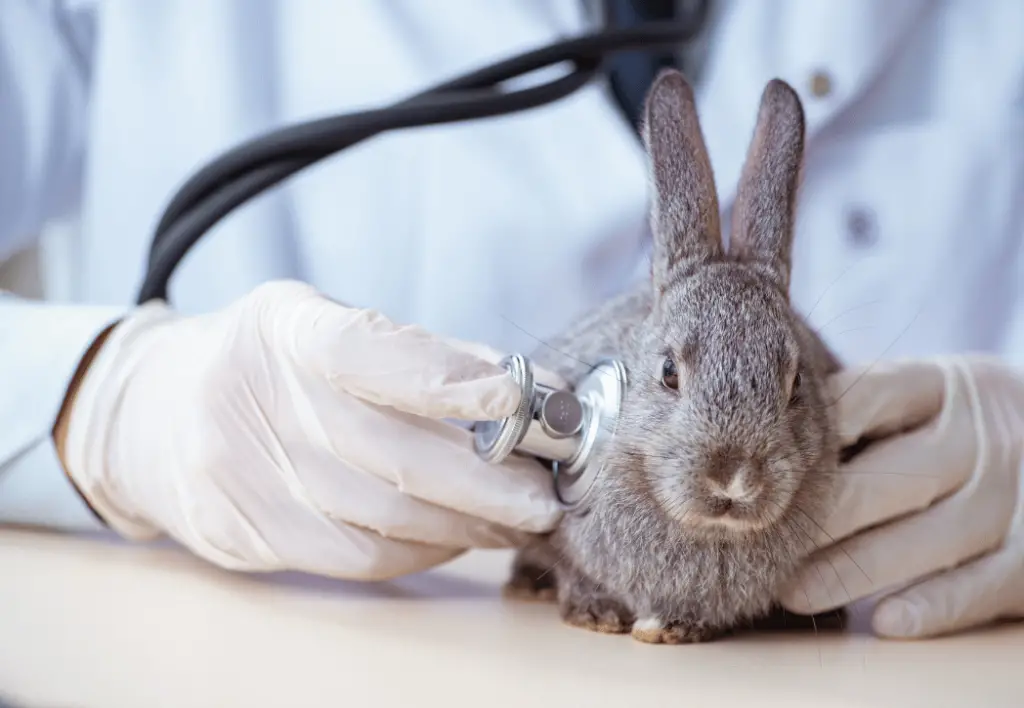Last Updated on July 18, 2023 by Leonard Harper
Rabbits are adorable and fluffy creatures that make wonderful pets. However, it is important to take care of them properly to ensure their health and happiness. One of the most important things to keep in mind is their hydration levels. Dehydration can be a serious issue for rabbits and can lead to a variety of health problems. Therefore, it is crucial to know how to tell if your rabbit is dehydrated.
There are several signs that can indicate dehydration in rabbits. These include dark urine, stiff skin, disinterest in food, disorientation, high body temperature, reduced urination, dry mouth and nose, and foul-smelling urine. If you notice any of these symptoms in your rabbit, it is important to take action immediately to rehydrate them and prevent further health complications. In the following sections, we will discuss each of these signs in more detail and provide tips on how to prevent dehydration in rabbits.
Symptoms of Dehydration in Rabbits
Rabbits require a constant supply of water to stay healthy. When a rabbit does not get enough water, it can become dehydrated. Dehydration can lead to serious health problems, so it is important to know the symptoms of dehydration in rabbits.
Some of the common symptoms of dehydration in rabbits are:
Lethargy: A dehydrated rabbit may appear lethargic or have a lack of energy. It may not move around as much as usual and may seem uninterested in its surroundings.
Fever: A dehydrated rabbit may have a high body temperature, which can cause it to feel warm to the touch.
Disorientation: A dehydrated rabbit may appear disoriented or confused. It may have trouble standing or walking and may seem uncoordinated.
Lack of appetite: A dehydrated rabbit may not eat or drink as much as usual. It may lose interest in its food and water bowls.
Diarrhea: Diarrhea can cause a rabbit to become dehydrated. If your rabbit has diarrhea, it is important to monitor its water intake closely.
- GI stasis: GI stasis is a condition that can occur when a rabbit’s digestive system slows down or stops working. This can cause dehydration, as well as other health problems.
- Dark urine: A dehydrated rabbit may have dark or concentrated urine.
- Wrinkled skin: Dehydration can cause a rabbit’s skin to lose its elasticity, which can result in wrinkles.
- Reduced urination: A dehydrated rabbit may produce less urine than usual.
- Dry mouth and nose: A dehydrated rabbit may have a dry mouth and nose.
- Sunken eyes: Dehydration can cause a rabbit’s eyes to appear sunken or hollow.
To check if your rabbit is dehydrated, gently pinch the skin on the back of its neck and release it. If the skin takes a long time to return to its normal position, your rabbit may be dehydrated. If you suspect that your rabbit is dehydrated, it is important to seek veterinary care as soon as possible.
Remember, prevention is key. Make sure your rabbit always has access to clean, fresh water and monitor its water intake closely. If you notice any of the symptoms of dehydration in your rabbit, take action immediately to prevent further health problems.
Causes of Dehydration in Rabbits
Dehydration in rabbits is a common problem that can lead to serious health issues if not addressed promptly. Understanding the causes of dehydration in rabbits can help you prevent it from happening and keep your furry friend healthy.
Lack of Water Supply
The most common cause of dehydration in rabbits is a lack of water supply. Rabbits need plenty of fresh water to stay hydrated, especially during hot summer months. If a rabbit doesn’t have access to enough water, they can quickly become dehydrated.
Wrong Temperature
Rabbits are sensitive to temperature changes. When temperatures are too high or too low, rabbits can become dehydrated. In hot weather, rabbits need access to cool areas with plenty of shade and water to stay hydrated.
Stress
Stress can also cause dehydration in rabbits. Stressful situations like moving to a new home or being introduced to a new rabbit can cause a rabbit to stop eating and drinking, leading to dehydration.
Body Weight
A rabbit’s body weight can also affect their hydration levels. Overweight rabbits are at a higher risk of becoming dehydrated because they require more water to maintain their body weight.
Natural Causes
In some cases, dehydration in rabbits can be caused by natural factors like illness or aging. Older rabbits are more susceptible to dehydration because their kidneys may not function as well as they used to.
Water Supply
It’s important to ensure that your rabbit has access to fresh water at all times. Check their water supply regularly to make sure it’s clean and not contaminated. You can also add water to your rabbit’s food to help keep them hydrated.
Dehydration in rabbits can be a serious problem, but it’s also preventable. By understanding the causes of dehydration in rabbits and taking steps to prevent it, you can help keep your furry friend healthy and happy.
Preventing Dehydration in Rabbits

Preventing dehydration is the key to keeping your rabbit healthy and happy. Rabbits need access to clean water at all times to stay hydrated. Here are some tips to help prevent dehydration in your rabbit:
Provide Fresh Water
Make sure your rabbit has access to fresh water at all times. Change the water in their bowl or bottle daily to keep it clean and fresh. If you notice your rabbit is not drinking from their water source, try changing the water temperature or using a different water dispenser.
Offer Hydrating Foods
Vegetables and fruits are a great source of hydration for rabbits. Offer your rabbit a variety of fresh vegetables and fruits like cucumber, celery, and watermelon to help keep them hydrated. Make sure to wash all produce thoroughly before feeding it to your rabbit.
Monitor Fluid Intake
Keep an eye on your rabbit’s fluid intake. If you notice your rabbit is not drinking enough water, you can offer them fluids using a syringe or dropper. You can also add a small amount of calcium to their water to encourage them to drink more.
Keep Water Clean
Make sure your rabbit’s water source is clean at all times. Change the water in their bowl or bottle daily and clean the dispenser regularly to prevent bacteria buildup.
By following these tips, you can help prevent dehydration in your rabbit and keep them healthy and happy. Remember to provide your rabbit with access to clean water and hydrating foods at all times, and monitor their fluid intake to ensure they are staying hydrated.
Treating Dehydration in Rabbits
Dehydration in rabbits can be a serious issue and requires prompt treatment. If you suspect that your bunny is dehydrated, it is important to take action quickly. Here are some steps you can take to treat dehydration in rabbits:
- Rehydration: The first step in treating dehydration is to rehydrate your rabbit. Offer your bunny fresh water and encourage them to drink. You can also offer them water-rich vegetables like cucumbers, lettuce, or celery. If your rabbit is severely dehydrated, you may need to administer fluids subcutaneously or intravenously. This should only be done by a veterinarian.
- Monitor Your Rabbit: Keep a close eye on your bunny to ensure that they are drinking and urinating normally. If you notice any changes in their behavior or symptoms, contact your veterinarian immediately.
- Offer Food: Once your rabbit is rehydrated, offer them fresh hay, vegetables, and pellets. Avoid feeding them anything that is high in sugar or carbohydrates, as this can cause digestive issues.
- Address Underlying Issues: If your rabbit’s dehydration was caused by an underlying issue like a toothache, bladder stones, or intestinal blockages, it is important to address these issues as well. Your veterinarian can help you determine the cause of your rabbit’s dehydration and develop a treatment plan.
- Provide Ceramic or Algae Water Bowls: Make sure your bunny has access to clean water at all times. Ceramic or algae water bowls can help keep the water cool and fresh for longer periods of time.
Dehydration in rabbits can be painful and even life-threatening. If you suspect that your bunny is dehydrated, contact your veterinarian immediately. Prompt treatment can help prevent serious complications and ensure a speedy recovery.
When to Seek Veterinary Care

It is important to seek veterinary care for your dehydrated rabbit if it is not drinking water or eating after rehydration or shows signs of severe dehydration, such as lethargy or rapid breathing. Rabbits can quickly become ill if they are not properly hydrated, and dehydration can lead to serious health problems.
If you notice any of the symptoms of dehydration in your rabbit, such as dark and smelly urine, wrinkled or tight skin, fever, lethargy, or lack of appetite, it is important to take action immediately. Make sure that your rabbit has access to an unlimited amount of clean, drinkable water that you yourself would drink.
If your rabbit is not responding to rehydration or is showing signs of severe dehydration, it is important to seek veterinary care immediately. Your veterinarian can perform a physical examination and run tests to determine the cause of your rabbit’s dehydration and provide appropriate treatment.
It is important to have the name and number of the nearest rabbit-savvy emergency room available in case of an emergency. Keep the emergency number in a place where you can get to it quickly. Your rabbit’s life could depend on it.
Remember, prevention is key. Make sure your rabbit always has access to clean, fresh water and is eating a healthy diet. Regular check-ups with your veterinarian can help catch any health problems early, before they become serious.
Conclusion
In conclusion, it is crucial to monitor your rabbit’s hydration levels regularly to ensure their survival. Dehydration in rabbits, both domesticated and wild, can lead to severe health issues, including organ failure.
As discussed earlier, some common signs of dehydration in a rabbit include reduced urination, dark and foul-smelling urine, dry mouth and nose, fever, lethargy, lack of appetite, and wrinkled skin. It is essential to take immediate action if you notice any of these symptoms in your dehydrated bunny.
One way to prevent dehydration in rabbits is by providing them with unlimited access to clean water. Ensure that your rabbit’s water supply is always fresh and free from contaminants. Additionally, you can also offer your bunny natural sources of hydration, such as fresh vegetables and fruits.
It is worth noting that a rabbit’s body weight can also affect their susceptibility to dehydration. Smaller rabbits are more prone to dehydration than larger ones. Therefore, it is crucial to monitor your rabbit’s water intake, especially during hot weather or when they are ill.
In summary, dehydration in a rabbit is a severe issue that requires immediate attention. By monitoring your rabbit’s hydration levels and taking proactive measures to prevent dehydration, you can ensure that your bunny stays healthy and happy.
Frequently Asked Questions
Leo, a novice urban farmer and avid writer hailing from Chicago, Illinois, finds his joy and inspiration in the company of rabbits. His affection for these cuddly creatures started when he was gifted a Mini Rex, named Poe, on his 18th birthday. Poe soon became a source of comfort, companionship, and surprisingly, creative inspiration. He soon expanded his brood to include three more rabbits of different breeds, each with their own engaging tale.
